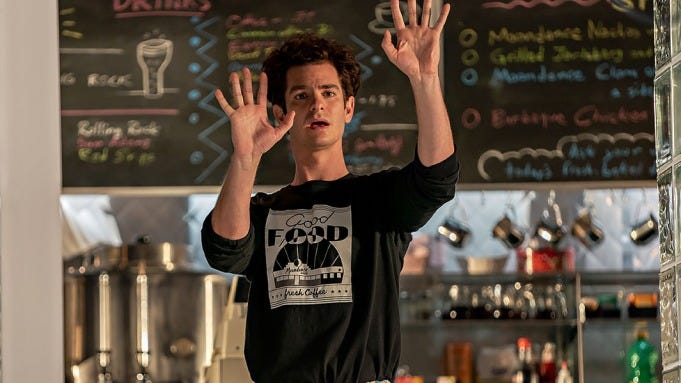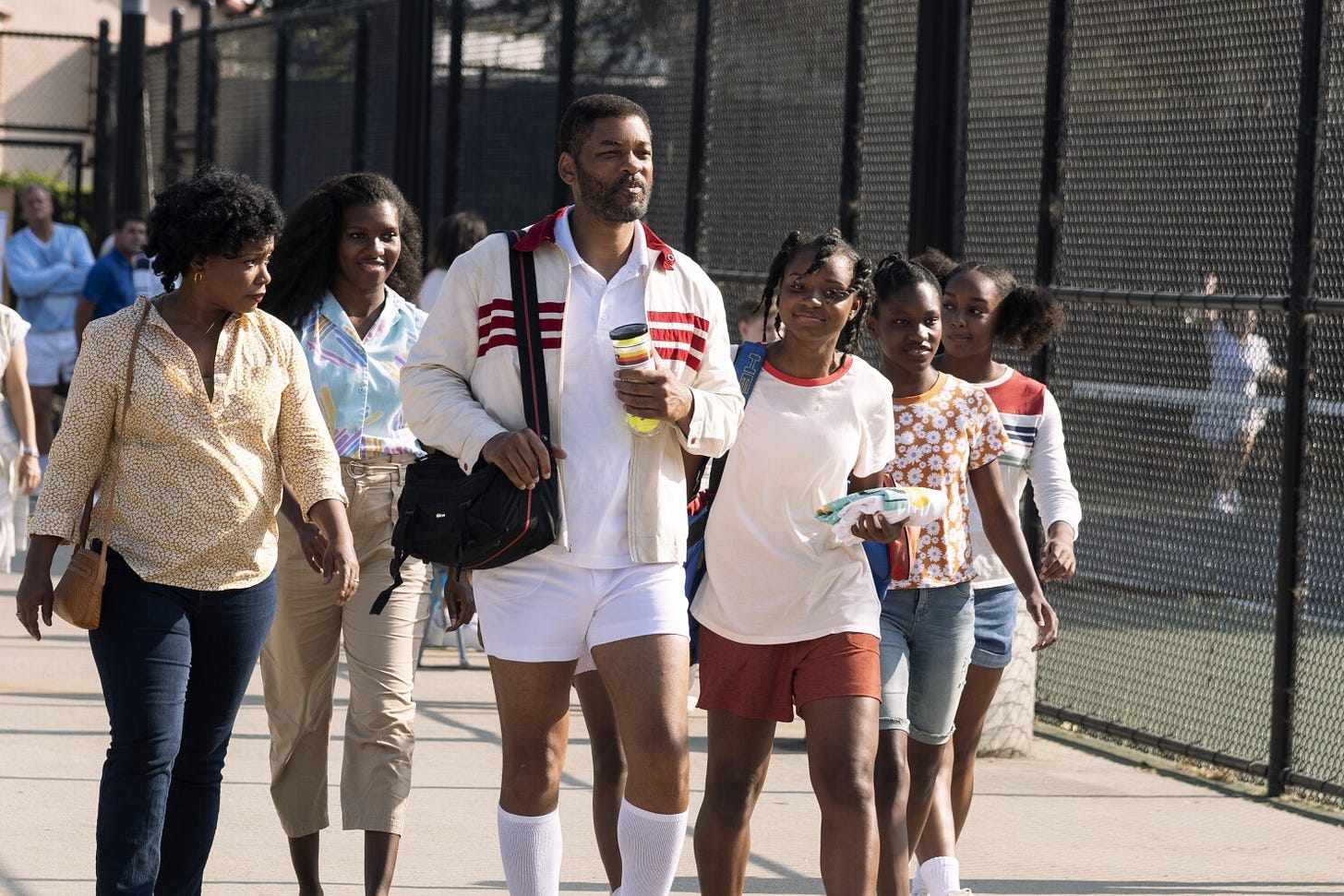Thanksgiving weekend movie roundup
Disney, Lin-Manuel Miranda, Will Smith and Nintendo make up for a great weekend of movie watching.
I hope you all had a great Thanksgiving. We had some pieces posted here over the holiday weekend, but those were all written and scheduled fairly in advance, so I was able to take a break from writing for a bit, enjoy a feast and time with family, and get a jump on some of our Christmas season celebrations.
We’re entering the best time of the year for movie lovers. As studios release their award hopefuls and big blockbuster swings, it’s a great time to be a critic. Traditionally, I spend the time between Nov. 1 and mid-December buried under screeners, trying to see as much as I can for end of the year voting duties. I took a year off participating with the Detroit Film Critics Society, so I don’t have access to all those screeners, and I’m going to spread the year-end viewing out a bit. I may not release my best-of list until early January.
In the meantime, as I play catchup, I’ll do a few of these roundups of shorter reviews. There’s a ton out there, and all of it is very easy to see. Here’s what I caught up with over the holiday weekend.
Tick, tick...BOOM!
Have we hit peak Lin-Manuel Miranda?
In June, Jon Chu’s adaptation of In the Heights hit theaters and HBO Max. Miranda provided the songs and voiced the title role for Netflix’s animated monkey movie, Vivo, in August. And this week, we’re discussing both his directorial debut, the adaptation of Jonathan Larson’s tick, tick...BOOM!, and Disney’s Encanto, for which he wrote the songs. I’m sympathetic to those feeling a bit over-saturated, but I don’t mind when he keeps cranking out such enjoyable work.
Tick, tick …. Boom! is based on a stage show Larson performed just a few years before Rent. It tells the story of his frustrated attempts to get his play Superbia off the ground, and how Larson’s impending 30 birthday added extra stress. The title gets its name from a sound Larson hears in the background the closer he gets to the big day, telling him he’s running out of time. While that could be a laughable bit of hubris — everyone imagines they’re getting past their sell-by date at 30 — for Larson, the dread was prophetic. He died at the age of 36, the night before Rent’s Broadway debut.
The musical accurately captures the dread many experience as they turn 30, fearing they haven’t done enough to achieve their dreams or change the world. Starring as Larson, Andrew Garfield is energetic and acquits himself well with the vocals. The film is clear-eyed about Larson; he’s a genius and he knows it, and the film brings to life his panic that the world might never discover his brilliance. But it also is aware that Larson’s confidence and unyielding focus on his art made him a difficult friend, lover, employee and tenant. Garfield captures the hubris and the passion, as well as a visceral joy for life. He’s aided by a strong supporting cast, particularly Robin de Jesus as best friend Michael, who at first seems to be Larson’s version of a sell-out cautionary tale but has deeper lessons to impart.
It’s easy to see why Miranda was attracted to this, and not just because Larson was an acknowledged influence on his own career. The story of a man working to accomplish his life’s work while sensing a looming deadline shares DNA with the lead character the playwright centered Hamilton around, and Miranda, who debuted the Tony-winning In the Heights before his 30th birthday, was a young genius much like Larson. Miranda also seems drawn to works of sincerity, and the musical’s setting in the early days of the AIDS epidemic provides compelling depth.
I’m probably an easier sell on big, vibrant emotional musicals like In the Heights, but tick, tick...BOOM! captures the same energy and liveliness. The songs cover a variety of different styles and most are showstoppers. While I don’t know that anything tops the crackling opening number “30/90,” I appreciated the Sondheim-inspired “Sunday,” featuring cameos from a who’s-who of Broadway icons, and the big closer, “Louder Than Words.” Miranda seems a bit timid with the visual staging of some of the more intimate numbers, with a few feeling like glossy music videos, but some of his larger concepts are inventive; even when he’s playing it safe, the songs never lose their impact or momentum. And what shagginess the film has only lends to its feeling of messy youthful optimism.
It’s been a big year for musicals, from the joy of In the Heights to the pitfalls of Dear Evan Hansen, with West Side Story waiting in the wings. tick, tick...BOOM! Is one of the high points.
tick, tick...BOOM! is now streaming on Netflix.
Encanto
Miranda’s songs are the big draw for Disney’s latest animated tale, and they’re supremely catchy. But there’s even more to enjoy here, making Encanto the best offering from Disney Animation since Moana.
Mirabel (Stephanie Beatriz) has grown up in a magical family in Colombia. Each of her parents, siblings and cousins is gifted a special power that helps them contribute to their community; even the house is magic. But when it came time for Mirabel to receive her gift, nothing happened. She’s largely been okay with it, content to direct all the attention at her special family; but visions of looming disaster cause Mirabel to dig into the family’s secrets and see if she can hold it all together.
Like I said, the big draw here seems to be Miranda’s songs; along with Brooklyn Nine-Nine’s Beatriz, he’s been front and center for all of the film’s marketing. And I suspect that those who are tired of his blend of hip-hop-flavored Latin pop and showtunes might roll their eyes at the familiarity of some of the arrangements. I happen to be a big fan of Miranda’s nerdy love for ten-dollar words and lightning-fast lyrics, and I found all the songs to be a lot of fun.
Mirabel is one of the most ridiculously likable Disney heroines in ages. She’s not a princess and, as portrayed by Beatriz, is an overcaffeinated, dorky delight. The animation has her constantly fidgeting and mugging, and with her insecurities and overflowing love for her family, she feels unique to the Disney family. And the film’s themes of self-acceptance and embracing flaws over perfection is handled well; there isn’t a villain here and the hero’s journey doesn’t take her far behind her home’s walls. But there’s an internal tension that hits more powerfully than we usually get.
It should be no surprise that Disney pushes its animators harder than most studios. But Encanto is a step above even the Mouse House’s best recent offerings. This is a vibrant movie, bursting with color and imagination. The family's casita is its own character, with floorboards and shutters that move to express its emotions; it's what would happen if the titular Monster House was cuddly. The film also moves at a brisk pace, delivering rapid-fire visual gags; at times, it may be a bit too frantic for its own good (you have to really pay attention to the song lyrics to understand what’s happening at times), but it’s still a charmer. I don’t think I’m ever going to particularly come around to the computer-generated people in these films; they miss the warmth of the traditional, hand-drawn animation and the skin has a plastic look to it (the better to sell toys, I guess). But it’s a small quibble; the characters all have personality and charm, and I quite enjoyed the journey.
Note: The film is preceded by a traditional, hand drawn short, Far From the Tree, and I really hope it’s a sign that Disney hasn’t let this form of animation die.
Encanto is now in theaters.
8-Bit Christmas
Yes, let’s get the obvious out of the way: HBO Max’s 8-Bit Christmas is a blatant retread of A Christmas Story. It has the same basic plot outline, episodic structure, childhood fantasy sequences and even the hyperbolic narration. It’s basically what would happen if The Goldbergs did one of their parodies of Bob Clark and Jean Shepherd’s classic.
But once you accept the familiarity, 8-Bit Christmas is a lot of fun. It uses the Christmas Story blueprint but finds its own ways to color inside the lines and winds up with something surprisingly sweet. In fact, by avoiding the Christmas Story intellectual property, it avoids the Easter eggs and callbacks that would constantly invite comparisons, and becomes its own festive thing.
The story finds adult Jake Doyle (Neil Patrick Harris) regaling his daughter with the magical Christmas in the 1980s where he obsessed over getting a Nintendo Entertainment System. It’s taken his neighborhood by storm, and only the rich jerk neighbor has one. Jake and his friends plot to get an NES, but it won’t be easy. His parents (Steve Zahn and June Diane Raphael) think the video game system will rot his brain, and the local parents protest video games after an unfortunate incident involving a temper tantrum, a broken TV and a family dog. Plus, Jake has to avoid the school bully, pick up the ever-increasing piles of dog poop in the backyard, endure wearing girls’ winter boots and make sure he doesn’t break his retainer.
Kevin Jakubowski wrote the screenplay based on his novel, and he brings a sense of detail and specificity that lend it a touch of nostalgic affection for both the 1980s and his Chicago hometown. Hewing to the familiar Christmas Story formula, he shades in love of roller rinks, bad ‘80s fashions, the Cabbage Patch Kids frenzy, and more. But director Michael Dowse never lets the pop culture commentary overwhelm the well-drawn sense of camaraderie and chemistry between his young casts. If A Christmas Story brought to life the indignities and endurance of childhood, this captures the 1980s child’s sense of constant frustration and sugar-buzzed excitement, not to mention a self-awareness about how American capitalism put the entire holiday season on steroids.
The film is helped by canny casting. All of the kids, particularly Winslow Fegley as young Jake, steer clear of being the type of overly-cute, catchphrase-spouting tykes we get in modern kids’ movies. They get into trouble, bicker, lie and scheme; they feel like real kids. I particularly liked the dumb menace Cyrus Arnold brings as the school bully and the weirdness that Jon Mulaney and the Sack Lunch Bunch’s Jacob Laval embodies (at one point, he eats erasers and sings “The Diarrhea Song”). Raphael and Zahn are solid additions as Jake’s parents; Raphael, in particular, can goose an ordinary line with humor, and Zahn supplies the film’s emotional anchor. David Cross is a welcome addition in a walk-on role as a black market toy dealer.
8-Bit Christmas aims for a touching finale and, surprisingly, lands it without feeling cloying or saccharine. While this can’t compete with what the Bob Clark classic brings in terms of warmth and humor, it will still be a welcome addition to the holiday lineup.
8-Bit Christmas is now streaming on HBO Max.
King Richard
I’ve seen several critics describe Will Smith as “disappearing into” the role of Richard Williams in King Richard. I have to disagree; I don’t think Will Smith can disappear into any role. His charisma and personality are too strong; I don’t think I’ve ever watched a performance of his and not noticed it was him.
But that isn’t necessarily a criticism. Tom Hanks is a great actor, and other than maybe Captain Phillips, I’ve ever seen him vanish into a role. Hanks brings a decency to his roles that is undeniably him, and he understands his limits. Likewise, Smith’s presence brings an inherent likability, charisma and passion to his characters, but he’s also proven that he can bring nuance and dial back those elements without abandoning them completely.
He delivers one of his strongest performances as Richard Williams, a man who claims to have had a 78-page plan for his daughters’ unprecedented tennis success before they were even born. Stubborn, overconfident and at times driven by his own self-interest and insecurities, the film doesn’t shy away from the fact that Williams could be abrasive. Another actor could have leaned harder into those aspects and, perhaps were the film not executive produced by Venus and Serena Williams, maybe some of his rougher edges would not have been sanded off.
But that’s not the character King Richard wants to portray. What Smith brings to the table, between an impressive commitment to replicating Williams’ voice and posture, is the intelligence, charisma and love. King Richard isn’t a portrait of a narcissist; it’s the portrait of a father determined to help his daughters rise above their situation, even when he might be his own worst enemy. Smith and the film don’t hide Richard’s flaws (although they may pull back on some of them), but neither do they portray him as a monster. He’s a man obsessed with a plan that sounds crazy; but it worked.
Reinaldo Marcus Green directs a movie intended to be a crowd-pleaser, and he succeeds. It’s tempting to ding the film for hitting so many of the standard biopic and sports movie beats, but it hits them all well and Green never makes the emotion feel less than organic. I understand those who may wonder why a story about Venus and Serena Williams is centered on their father, but I think it’s canny for the movie to show that behind every great athlete is a solid support team. Venus and Serena’s success is due, in part, to people who took the time to come alongside them, and their parents were a major part of that journey.
The film is most successful when it explores other ideas within that broader formula. It’s a powerful and often moving look at the challenges people face because of circumstances beyond their control, whether that’s the color of their skin or their economic status. It examines the role of privilege in sports. Most affectingly, it’s a story about parenting and trying to provide the best for your children while still providing the love, discipline and access to experiences that will help them be well-adjusted humans, even if that requires extra patience or a willingness to hold back when unprecedented offers are in reach. Sometimes, parents’ desires for their children’s success can turn into control and be more about the parents than the children; the film is clear-eyed about that as well, and the film’s strongest scene is a confrontation between Richard and his wife Brandy (Aunjanue Ellis), where the two speak strongly together without it feeling melodramatic or making it feel as if the family is at risk.
Smith is, understandably, getting the lion’s share of the praise for this film. But Ellis is outstanding as Brandy, who both supports and trusts Richard but refuses to be steamrolled or silenced. Saniyya Sidney and Demi Singleton also go toe to toe with Smith as Venus and Serena, respectively, with the added challenge that they must also convincingly portray two of the world’s greatest athletes. And Jon Bernthal is a pleasure playing against type as the supportive, enthusiastic and at times frustrated coach who agrees to take Venus on at no charge.
There’s a bad habit critics have of dinging films simply for having a broad audience appeal. I fall prey to that from time to time. King Richard isn’t experimental, ground-breaking or especially deep. But it is a rousing story with something to say about sports, parenting and American culture. That it can be both well thought out and a sports movie that draws cheers shouldn't be overlooked; it’s one of the most enjoyable movies of the year.
King Richard is now in theaters and on HBO Max.









